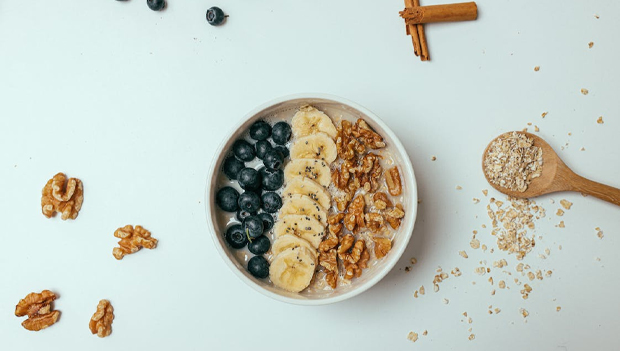
It's not exactly known when oats were first consumed, but it's believed to be thousands of years ago. Oats are thought to have originated in Asia due to the many varieties found there. Today, they are a staple in homes around the globe, and rightfully so.
Oats, in their natural form, are a superfood thanks to their nutrient makeup. With 150 calories per half-cup serving, rolled oats provide 26 grams of slow-release, complex carbohydrates and 6 grams of protein—great fuel for a workout. But perhaps the most widely publicized benefit of oats is their fiber content. With 4 grams of fiber per serving, oats are particularly a great source of soluble fiber.
We consulted with a dietitian to learn more about what makes oatmeal such a superfood. Whether you’re an overnight oats lover or on the fence about this grain-based soluble, this guide breaks down the many health benefits of oatmeal, plus some of the best ways to enjoy oats.
What is Oatmeal?
Oats are actually the seeds of oat grass. In their whole form, they are called oat groats. When they are steamed and flattened, they are called rolled oats. When they are sliced with big steel blades, they are called steel-cut oats. Both old-fashioned rolled oats and steel-cut oats provide similar health benefits. A big difference lies in their texture, with the steel-cut oats being lumpier when cooked.
Traditional oatmeal—or porridge—is cooked and eaten warm. The flavor and texture possibilities of oats are endless. Raw rolled oats can even be soaked in liquid overnight and eaten cold the next day. With their subtle taste, there is room for a huge variety of flavor additions. Oats can be ground down to make flour for pancakes, muffins, cookies and other baked goods. Not only do the benefits of oatmeal impress from a nutritional standpoint, they are also very versatile.
Benefits of Oatmeal
The health benefits of oatmeal are many, but here's a list of the top 7 benefits of oatmeal:
- Cholesterol reduction. Thanks to the soluble fiber, known as beta-glucan, oats have demonstrated a clear effect in reducing LDL cholesterol. It's thought that because the soluble fiber forms a gel, it collects the cholesterol that would normally be reabsorbed by the body in the GI tract. Rather than being reabsorbed, it is excreted from the body with a regular bowel movement.
- Weight loss. Clinical studies have observed significant weight reduction with the regular intake of oats. This is likely due to the feeling of fullness that oats provide which can effectively curb hunger for an extended period of time. Although there's some evidence to support the theory that oat consumption actually reduces fat storage. Whatever the reason, if you're looking to lose weight, you may want to consider including oatmeal in your breakfast routine.
- Healthy Microbiome. We are just scratching the surface on the impact the gut microbiome has on our overall health. We do know it has an important effect on the immune system and metabolic functions. Thanks to their prebiotic fiber, oats have been shown to alter populations of certain bacteria in the microbiome in a positive way. This impact may contribute to some of the benefits of oats such as their cholesterol lowering effects.
- Disease prevention. The consumption of oats on a regular basis, has been linked to preventing certain diseases, such as atherosclerosis, dermatitis, and even certain cancers. This is due to phenolic compounds, saponins, sterols, and phytic acid, all bioactive components from plants that protect against certain pathogens and diseases.
- Blood sugar control. Research shows that oats can help keep blood sugars in check, especially in those with type 2 diabetes. In a recent study, diabetic individuals that consumed oatmeal required less insulin throughout the day, and after 4 weeks showed improvement in their A1C. This effect seems especially potent with thicker cut oats rather than instant oatmeal.
- Regularity. Because of the soluble fiber present in oatmeal, and likely its beneficial effect on the gut microbiome, it is a great food for bowel regularity and constipation relief. A meta analysis reviewed all studies on oats in relation to bowel health and found the consumption of oats increased the weight of stools (thanks to fiber), while decreasing the incidence of constipation. More reason to have that bowl of oatmeal every morning.
- Antioxidants galore. Oats are a great source of antioxidants such as avenanthramides, vitamin E, phenolic compounds, flavonoids, and phytic acid. Antioxidants work to scavenge free radicals to reduce oxidative stress and inflammation. More research is needed in this area to determine just how active these antioxidants are, which will determine how powerful their disease-fighting potential is.
Types of Oatmeal
Oats come in a variety of shapes and sizes. Let's break down the options.
Oat groats
The whole, intact kernel of the oat. These are much less common and often hard to find commercially. However, they can be made into oatmeal by cooking for a long period of time. Because they are the whole oat kernel, they take longer to soften, thus requiring a longer cook time.
Steel-Cut Oats
Also called Irish oats, these oats are processed by taking whole oat groats and slicing them with steel blades. When compared to old-fashioned or quick-cooking oats, steel-cut oats have a lower glycemic index and a tad more fiber. Because they are in the form of a thicker grain, they take longer to cook than traditional old-fashioned oats.
Old-Fashioned Oats
Oat groats that have been steamed and flattened. Because they are thinner, they cook more quickly and have a softer, smoother texture. This form of oats is commonly used in baking as well.
Quick-Cooking Oats
Also, oat groats that have been steamed and flattened. However, rather than being partially steamed like old-fashioned oats, they are cooked all the way through, and later dried. As the name suggests, they cook even quicker than old-fashioned rolled oats. Because they require further processing, the beneficial effects on blood sugar are pretty much lost. However, the beneficial soluble fiber, beta-glucan, remains.
Instant Oats
There is yet an even finer texture of oat. These are sometimes pre-cooked, but in general, they are milled extra thin, in order to cook in even less time. Instant oats are usually intended for microwave use when on the go. As with quick-cooking oats, the beneficial glycemic effects are diminished due to their processing.
How to Add Oatmeal into Your Diet
Adding oatmeal to your everyday diet is one of the best ways to enjoy the many benefits of this superfood. And because oats are so versatile, this can be done in a variety of ways.
Of course, the traditional way is by making hot oatmeal, in the form of porridge, over the stove in the morning. As you now know, this process can be shortened by using quick-cooking oats, or even instant oats to get that hot bowl of oatmeal you desire.
The beauty of oatmeal is that it is a blank canvas for all of the healthy toppings and add-ins you can think of in order to take that bowl of porridge and turn it up a notch. Some delicious options include:
- Apples and cinnamon: Chop up an apple and cook it along with your oatmeal in the pot and add cinnamon as desired.
- Banana nut: After your oatmeal is cooked, top it with sliced banana and walnuts.
- Pineapple coconut: You can either cook the pineapple along with your oatmeal or add it to the top of already cooked oatmeal with unsweetened coconut flakes.
- Trail mix: Add in a variety of dried fruits, such as raisins, dates, or dried cranberries along with mixed nuts and seeds like sliced almonds, pumpkin seeds, and even peanuts.
- Peanut butter berry: Swirl a tablespoon of peanut butter into your hot oatmeal and add in berries of choice.
- Combine oatmeal with protein powder: Another great way to incorporate oatmeal into your daily routine is to mix it with a bit of protein powder—that way, you get a healthy carb source and a boost of protein for a well-balanced meal. Or, use a protein powder like Gainful that incorporates oats into its formula for an easy 2-in-1 meal.
What if you aren't in the mood for hot cereal? Maybe it's summertime, or you just can't get in the mood for traditional oatmeal. There are other options.
Consider overnight oats. You can make these by mixing together equal parts oats and liquid, then allowing them to sit overnight. Again, the flavor options are endless so get creative. In the morning, the oats will soften and you will have a cold cereal to enjoy.
You might also like baked oatmeal. You can make this by mixing together oats, liquid of choice, eggs, baking powder, and a few more ingredients to add flavor. Then bake it. Once cooled, it can be sliced up for a grab-and-go option.
If none of these pique your interest, oats can be added to smoothies to help thicken them up and add a boost of complex carbohydrates. You could sprinkle them into baked goods and even meatballs or meat loaves. They can be ground in a high-speed blender into a flour, and then used to replace some wheat flour in recipes. The possibilities are never-ending!
FAQs About Oatmeal
Is it good to eat oatmeal every day?
Regular consumption of oatmeal gives you more opportunity to reap all of the health benefits that come along with oats. Eating oatmeal daily may help reduce your risk of certain diseases, help you maintain a healthy weight, improve your bowel health, provide a boost of antioxidants, and more.
What is the healthiest way to eat oatmeal?
The healthiest way to eat oatmeal is to avoid adding sugars and saturated fat like butter and whole milk. You can include low fat cows milk or milk of choice, and sweeten the oatmeal with fresh or dried fruit.
What is the best thing to put in oatmeal?
The possibilities are endless, but some of the healthiest options are fruit, nuts, and seeds.
Should I eat oatmeal in the morning or afternoon?
This is up to you because whether you eat oatmeal in the morning or afternoon, you'll reap the same benefits. Oatmeal is often eaten in the morning, and with its complex carbohydrates that are slowly released, they keep you feeling full for an extended period of time.


